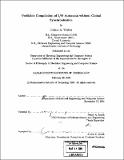Verifiable compilation of I/O automata without global synchronization
Author(s)
Tauber, Joshua A. (Joshua Allen)
DownloadFull printable version (15.13Mb)
Alternative title
Verifiable compilation of input-output automata without global synchronization
Other Contributors
Massachusetts Institute of Technology. Dept. of Electrical Engineering and Computer Science.
Advisor
Nancy A. Lynch.
Terms of use
Metadata
Show full item recordAbstract
Part I of this thesis presents a strategy for compiling distributed systems specified in IOA into Java programs running on a group of networked workstations. IOA is a formal language for describing distributed systems as I/O automata. The translation works node-by-node, translating IOA programs into Java classes that communicate using the Message Passing Interface (MPI). The resulting system runs without any global synchronization. We prove that, subject to certain restrictions on the program to be compiled, assumptions on the correctness of hand-coded datatype implementations, and basic assumptions about the behavior of the network, the compilation method preserves safety properties of the IOA program in the generated Java code. We model the generated Java code itself as a threaded, low-level I/O automaton and use a refinement mapping to show that the external behavior of the system is preserved by the translation. The IOA compiler has been implemented at MIT as part of the IOA toolkit. The toolkit supports algorithm design, development, testing, and formal verification using automated tools. The IOA language provides notations for defining both primitive and composite I/O automata. Part II of this thesis describes, both formally and with examples, the constraints on these definitions, the composability requirements for the components of a composite automaton, and the transformation a definition of a composite automaton into a definition of an equivalent primitive automaton.
Description
Thesis (Ph. D.)--Massachusetts Institute of Technology, Dept. of Electrical Engineering and Computer Science, 2005. Includes bibliographical references (p. 283-293).
Date issued
2005Department
Massachusetts Institute of Technology. Department of Electrical Engineering and Computer SciencePublisher
Massachusetts Institute of Technology
Keywords
Electrical Engineering and Computer Science.